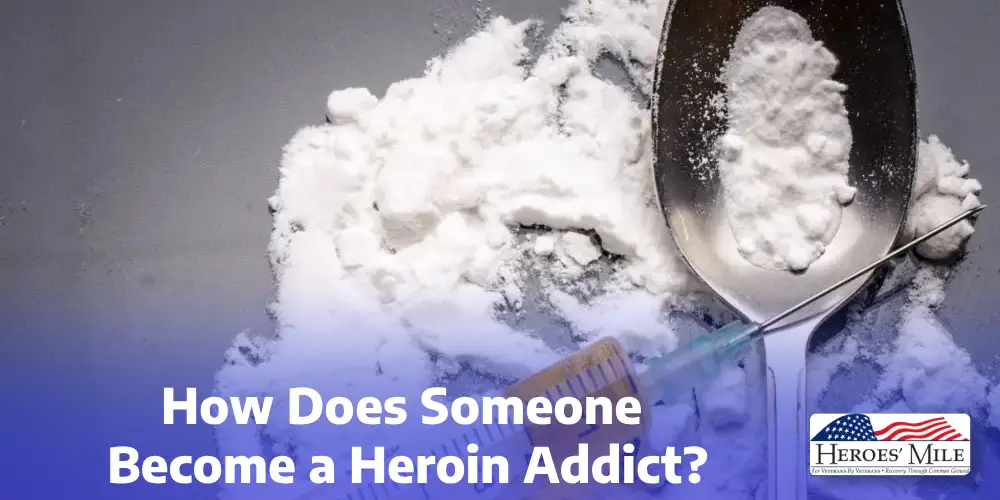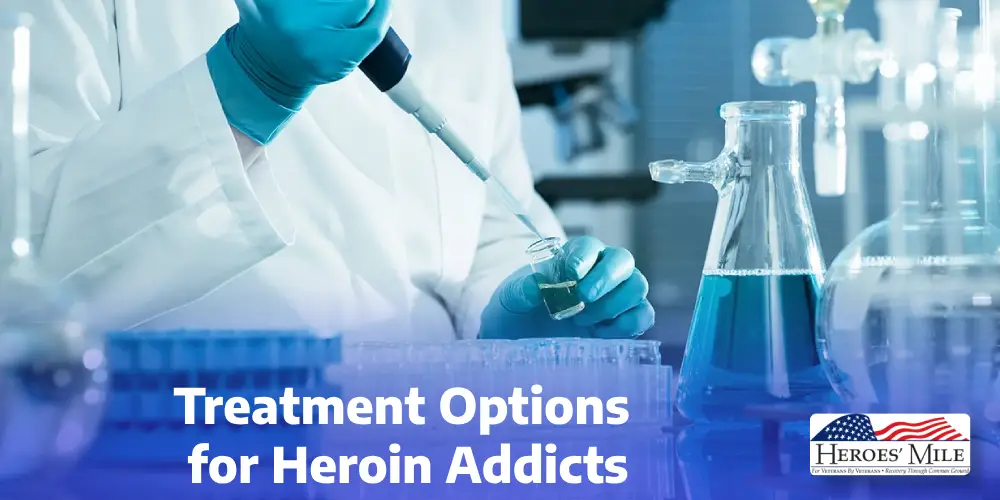If you are addicted to heroin, it may be hard to see yourself beyond the label of a heroin addict. However, you are more than your addiction. You’re also a individual, a loved one, and someone who deserves to be free from the harmful effects of your addiction. If you are ready to seek addiction treatment, Heroes’ Mile is here for you. This rehab facility for individuals can help you reconnect with yourself while you work through the different phases of your recovery journey.
How Does Someone Become a Heroin Addict?

How Does Someone Become a Heroin Addict?
Heroin addiction is a substance use disorder characterized by changes in the brain and uncontrollable behavior. These changes in the brain and body cause individuals to seek out the drug, despite negative physical, emotional, and social side effects. Chronic use of heroin changes the structure and functioning of the brain, causing tolerance and mental dependence. This begins as psychological dependence and is the reason a heroin addict is unable to function or live without the drug, even if they might want to stop using it.
Long-term use will also cause physical dependence. This can make recovery for a heroin addict difficult. Oftentimes, individuals will continue to use heroin to avoid dangerous and unpleasant withdrawal symptoms. One of the biggest benefits of seeking treatment at a rehab facility is having both the mental and physical aspects of addiction addressed throughout recovery to combat the difficulty of recovery.
What Does Heroin Look Like?
Heroin is a semi-synthetic drug synthesized from morphine and made from opium poppy plants. It goes by other names, such as smack or H, and it comes in several different forms.
- Fine white powder. This is the purest form of heroin, but the consistency can vary. When found on the street, it is often mixed with substances that do not disrupt the white color, such as cocaine.
- Brown or black powder. This form is more commonly found than pure heroin and gets its color from the impurities it’s made with.
- Black tar heroin. This form has the consistency of a black, sticky gel and has the misconception of being less potent because of its cruder form. However, this misconception is known to be the reason for heroin overdose because individuals underestimate the potency of what they are taking.
Symptoms of Heroin Addiction
There are many signs and symptoms of heroin addiction that will vary for each person. However, they depend on factors including genetic makeup, how much of the drug is used, and for the length of time someone has been a heroin addict.
Psychological Symptoms
Behavioral Symptoms
- Lying about their heroin use
- Avoiding eye contact
- Lack of interest and motivation
- Social withdrawal
- Hostility toward loved ones
- Stealing or borrowing money from others
- Covering skin to hide track marks
- Decrease in personal hygiene
Physical Symptoms
- Slow or irregular breathing
- Uncontrollably falling asleep
- Flushed or itchy skin
- Nausea and vomiting
- Small pupils
- Incoherent or slurred speech
Risk Factors for Becoming a Heroin Addict
An individual doesn’t become a heroin addict overnight. For instance, a multitude of risk factors from genetics to the environment lead individuals down the path of addiction. Some of the biggest risk factors for addiction include:
- Misuse of prescription opioids like morphine or oxycodone
- Family history of drug addiction
- History of drug use or experimentation
- History of mental health disorders like PTSD
- Poverty or unemployment
According to the National Institute on Drug Abuse, active duty and retired military personnel are at a higher risk of developing substance use disorders compared to the general population.
Co-Occurring Disorders for Heroin Addicts
Many individuals who are also heroin users have at least one co-occurring mental illness. Typically, a individual turns to opioids as a means of self-medicating to reduce their mental health symptoms. Some mental illnesses that co-occur with heroin abuse are:
- Post-traumatic stress disorder
- Anxiety disorders
- Depressive disorders
- Personality disorders
- Eating disorders
Treatment Options for Heroin Addicts

Treatment Options for Heroin Addicts
Not all treatment centers are the same, just as not all heroin addicts are the same. As a result, Heroes’ Mile uses evidence-based comprehensive addiction treatment to help individuals cope with every phase of recovery. In addition to these effective treatment plans, every staff member formally served in the military, creating a safe space for individuals to recover from substance abuse whether they participate in inpatient or outpatient treatment programs.
Inpatient Treatment
Inpatient treatment or residential rehab at Heroes’ Mile is the most intensive level of care. In addition to providing 24/7 care, patients have access to educational therapies and a network of support groups.
For individuals seeking immediate help detoxing, they can begin their treatment by entering the drug and alcohol detoxification program before moving on to another program. Heroin withdrawal symptoms can be unpleasant and even deadly. For this reason, detox should be done under the care and supervision of professionals.
After patients have completed the detox process, they can move on to other treatment programs to continue receiving help for their addiction. Many individuals suffer from PTSD or trauma, causing them to turn to substances, then eventually become heroin addicts. Once you seek help for your addiction, you will learn coping skills in a judgment-free space designed to nurture healthy recovery.
Outpatient Treatment
Outpatient treatment is ideal for those who have completed inpatient treatment or are entering treatment with less severe symptoms. These services share a lot of similarities with inpatient care. However, patients in outpatient treatment attend the programs less frequently. They may only attend treatment at the center for a few hours per day.
These programs continue to help individuals work on their physical and mental health as they transition from being heroin addicts to recovering addicts. Many individuals in this phase of their recovery journey begin to make amends with loved ones, go back to work, and get involved in their communities.
In addition to less intensive treatment, patients are more focused on planning for the future. This program is often used as a transitional period as patients work to put their identity as heroin addicts in the past. Relapse prevention planning is a major focal point to help patients maintain their newfound sobriety and deal with the long-term effects of heroin.
Getting Help as an individual and a Heroin Addict
No one plans to become a heroin addict, but genetic factors and traumatizing experiences can cause individuals to seek out substances that can mitigate unpleasant mental and physical symptoms.
This is why Heroes’ Mile is committed to helping individuals heal from addiction caused by the invisible wounds of war. If you are ready to seek treatment, contact Heroes’ Mile by calling 888-838-6692 or filling out the online contact us form. Asking for help is one of the hardest parts of recovery, but it will start you on your journey to lifelong recovery.
Video
Heroin: Through the Eyes of a Younger Brother, Tommy Sablan – TED Talk
Growing up in the 70’s and 80’s, Tommy was the younger brother of two heroin addicts. Tommy takes you through the different stages of his life as his brothers were going through their addiction.
“I am amazed that there’s a heroin epidemic that is happening in our schools and community today. I have been given the wisdom to speak to young students and families that are struggling because of the fact I grew up with two brothers that were heroin addicts. I do not preach to not do drugs. People already know that but what I can tell is my family’s story and maybe it will help others make better choices in life.”
News Audio
Deadliest phase of fentanyl crisis eases, as all states see recovery – NPR
Elena’s partner, Vadim, who also smokes fentanyl laced with xylazine, said people facing severe addiction have adapted to fentanyl’s incredible potency, often using smaller quantities.
“I think people have adjusted. When fentanyl first came out, people were used to shooting heroin. That’s why they were dying. You need a lot less [fentanyl],” he said.
FAQ
- What are the signs of heroin addiction?
Common signs include drowsiness, constricted pupils, weight loss, neglect of personal hygiene, withdrawal from loved ones, and track marks from injections. - How does heroin affect the brain?
Heroin binds to opioid receptors, triggering a surge of dopamine that creates euphoria but also leads to dependency and long-term brain changes. - What are the withdrawal symptoms of heroin?
Symptoms include nausea, vomiting, muscle pain, sweating, anxiety, insomnia, and intense cravings, usually peaking within 48-72 hours after the last dose. - Is heroin addiction treatable?
Yes, heroin addiction is treatable through a combination of medical detox, therapy, and medication-assisted treatment (MAT) like methadone or buprenorphine. - Where can I find help for heroin addiction?
Many rehab centers, including Heroes’ Mile Behavioral Hospital, offer specialized programs for heroin addiction treatment, including inpatient and outpatient care.
Review
